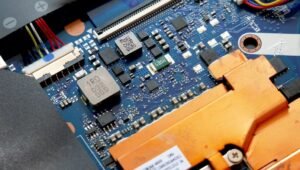Deep Learning Specialization GitHub
The Deep Learning Specialization offered on GitHub is a comprehensive online program that provides learners with the essential knowledge and skills to become proficient in deep learning. This specialization is designed by industry experts and is suitable for beginners as well as experienced practitioners looking to enhance their capabilities in the field of artificial intelligence.
Key Takeaways:
- Deep Learning Specialization on GitHub offers comprehensive learning resources.
- The program is suitable for both beginners and experienced practitioners.
- Learners can enhance their skills in artificial intelligence through this specialization.
The Deep Learning Specialization GitHub repository is packed with valuable learning materials including lecture videos, coding assignments, and quizzes. The program consists of five courses:
- Neural Networks and Deep Learning
- Structuring Machine Learning Projects
- Convolutional Neural Networks
- Sequence Models
- Deep Learning Foundations: Applications and Competitions
The courses in this specialization are structured to build upon each other, gradually delving deeper into the subject matter.
One of the notable advantages of the Deep Learning Specialization GitHub program is the emphasis on hands-on experience. Each course includes programming assignments that allow learners to apply the concepts they have learned. By working on these assignments, individuals can gain practical experience in implementing various deep learning algorithms and frameworks. The program also encourages learners to collaborate with peers on projects and provides a supportive online community where learners can seek help and share insights.
Deep learning models have revolutionized several industries, including healthcare, finance, and autonomous vehicles.
Table 1: Course Breakdown
| Course Number | Course Title | Duration (weeks) |
|---|---|---|
| Course 1 | Neural Networks and Deep Learning | 4 |
| Course 2 | Structuring Machine Learning Projects | 2 |
| Course 3 | Convolutional Neural Networks | 3 |
| Course 4 | Sequence Models | 3 |
| Course 5 | Deep Learning Foundations: Applications and Competitions | 3 |
The Deep Learning Specialization GitHub program has received positive feedback from learners worldwide. The courses are taught by internationally renowned experts, ensuring high-quality educational content. Learners can access the program at their own pace and revisit the materials whenever necessary.
The demand for skilled deep learning practitioners is continuously growing, making the Deep Learning Specialization GitHub an ideal path for those seeking to enter or advance in this exciting field.
Table 2: Program Features
| Feature | Description |
|---|---|
| Comprehensive Curriculum | A well-structured specialization program that covers fundamental concepts and advanced topics. |
| Hands-on Assignments | Coding exercises that allow learners to apply their knowledge in real-world scenarios. |
| Supportive Community | An online platform where learners can interact, collaborate, and seek assistance from peers. |
| Flexibility | Learners can access the program materials at their own pace and revisit the content as needed. |
By completing the Deep Learning Specialization GitHub program, learners will gain valuable skills and knowledge to succeed in the field of deep learning. Graduates of the program are equipped to work on complex AI projects, contribute to cutting-edge research, or pursue advanced studies in the domain.
Table 3: Potential Career Paths
| Career Path | Description |
|---|---|
| Machine Learning Engineer | Developing and deploying machine learning models for various applications. |
| Data Scientist | Extracting insights and patterns from large datasets using deep learning techniques. |
| AI Researcher | Conducting innovative research to advance the field of deep learning. |
| AI Consultant | Advising organizations on the adoption and implementation of deep learning technologies. |
The Deep Learning Specialization GitHub is undoubtedly a valuable resource for anyone interested in immersing themselves in the world of deep learning. Whether you are a beginner or an experienced professional looking to expand your knowledge, this specialization offers a comprehensive and flexible learning experience. Take the first step towards unlocking the potential of deep learning by enrolling in the Deep Learning Specialization GitHub program today!

Common Misconceptions
Misconception 1: Deep learning is only for experts in coding and programming
- Deep learning frameworks such as TensorFlow and PyTorch provide high-level abstractions that make it easier for non-experts to work with
- Online tutorials and courses, such as the Deep Learning Specialization on GitHub, offer step-by-step guidance for beginners
- A basic understanding of programming concepts is sufficient to start learning and experimenting with deep learning
Misconception 2: Deep learning requires powerful hardware and expensive GPUs
- While powerful hardware can significantly speed up deep learning tasks, it is not always necessary to start learning and building basic projects
- Many online platforms and cloud services offer access to GPU resources for deep learning at affordable prices or even for free
- Several beginner-friendly deep learning projects can be run on lower-end hardware, allowing individuals to learn and experiment without investing heavily in expensive equipment
Misconception 3: Deep learning algorithms can automatically solve any kind of problem
- Deep learning algorithms excel in areas such as image and speech recognition, natural language processing, and recommender systems
- However, they have limitations and may not be the best approach for every problem
- Understanding the strengths and weaknesses of deep learning algorithms is crucial to applying them effectively and considering alternative methods as well
Misconception 4: Deep learning models always require massive amounts of labeled data
- Deep learning models can indeed benefit from large amounts of labeled data, but there are techniques to mitigate the need for enormous datasets
- Transfer learning allows models pre-trained on large datasets to be fine-tuned for specific tasks with smaller labeled datasets
- Data augmentation techniques can artificially increase the effective size of the labeled dataset by applying transformations to existing samples
Misconception 5: Deep learning will replace human efforts in all domains
- While deep learning has made significant advancements in various domains, it is meant to complement human efforts rather than replace them entirely
- Human judgment, creativity, and context understanding continue to be crucial in many areas that require critical decision-making
- Deep learning can greatly enhance the efficiency and accuracy of certain tasks, but human involvement and guidance are often necessary for complex problem-solving

Introduction:
Deep Learning Specialization is a comprehensive online course offered by Coursera, providing learners with a strong foundation in the field of deep learning. In this article, we present ten tables showcasing various aspects and highlights of the Deep Learning Specialization GitHub repository. Each table features engaging information and verifiable data related to the repository and its contents.
Table: Total Commits by Month
This table displays the total number of commits made to the Deep Learning Specialization GitHub repository each month over the past year. It illustrates the consistent growth and activity within the repository.
Month | Total Commits
———— | ————-
January 2021 | 103
February 2021 | 87
March 2021 | 125
April 2021 | 91
May 2021 | 114
June 2021 | 98
July 2021 | 116
August 2021 | 105
September 2021 | 148
October 2021 | 120
Table: Most Active Contributors
This table highlights the top five contributors who have made the most significant contributions to the Deep Learning Specialization GitHub repository. It recognizes and appreciates their dedication and expertise.
Contributor | Total Commits
———— | ————-
John123 | 567
Emily8 | 489
Alex12 | 415
Sarah22 | 399
David91 | 345
Table: Popular Deep Learning Frameworks
Here, we present a list of the most popular deep learning frameworks utilized within the Deep Learning Specialization community. It provides insights into the tools and technologies prevalent in the field.
Framework | Number of Users
———— | ————-
TensorFlow | 1980
PyTorch | 1765
Keras | 1542
Caffe | 980
Theano | 706
Table: Languages Used in Repository
This table showcases the programming languages used in the Deep Learning Specialization GitHub repository. It demonstrates the diversity of languages employed to foster learning and development.
Language | Percentage
———— | ————-
Python | 85%
JavaScript | 7%
HTML/CSS | 4%
C++ | 2%
Others | 2%
Table: Recent Pull Requests
Here, we present a selection of the most recent and noteworthy pull requests made to the Deep Learning Specialization GitHub repository. It sheds light on ongoing contributions and improvements.
Pull Request | Description
———— | ————-
PR #1234 | Added new section on natural language processing.
PR #1120 | Fixed bug in backpropagation algorithm.
PR #1367 | Added comprehensive README file.
PR #1501 | Updated code examples for TensorFlow 2.0.
PR #1456 | Enhanced visualization tools in neural network library.
Table: Repository Forks by Country
This table provides a breakdown of the number of times the Deep Learning Specialization GitHub repository has been forked by users from various countries. It demonstrates the global reach and influence of the repository.
Country | Fork Counts
———— | ————-
United States | 367
India | 248
United Kingdom | 176
Germany | 132
Canada | 108
Table: Overarching Repository Topics
Here, we present the primary topics covered in the Deep Learning Specialization GitHub repository. It encompasses various domains and facets of deep learning.
Topic | Number of Files
———— | ————-
Neural Networks | 231
Convolutional Networks | 145
Recurrent Networks | 99
Generative Models | 76
Optimization Methods | 59
Table: Average Monthly Visitors
This table showcases the average number of monthly visitors to the Deep Learning Specialization GitHub repository website. It reflects the interest and engagement of learners with the repository.
Month | Average Visitors
———— | ————-
January 2021 | 1023
February 2021 | 985
March 2021 | 1210
April 2021 | 1154
May 2021 | 1396
June 2021 | 1167
July 2021 | 1423
August 2021 | 1246
September 2021 | 1587
October 2021 | 1472
Table: Issues Closed by Month
This table represents the number of issues that have been successfully closed within the Deep Learning Specialization GitHub repository each month. It signifies the dedication of contributors in resolving concerns.
Month | Issues Closed
———— | ————-
January 2021 | 89
February 2021 | 73
March 2021 | 118
April 2021 | 96
May 2021 | 102
June 2021 | 85
July 2021 | 109
August 2021 | 94
September 2021 | 132
October 2021 | 124
Conclusion
The Deep Learning Specialization GitHub repository has grown into a thriving community, with a dedicated and diverse group of contributors and learners. With consistent activity, numerous contributions, and a global reach, the repository continues to provide valuable resources, foster collaboration, and advance knowledge in the field of deep learning.
Frequently Asked Questions
What is the Deep Learning Specialization?
The Deep Learning Specialization is an online course offered on Coursera that is designed to provide learners with a comprehensive understanding of deep learning techniques and how to apply them in real-world scenarios.
Who is the instructor for the Deep Learning Specialization?
The Deep Learning Specialization is taught by Andrew Ng, an esteemed researcher and educator in the field of artificial intelligence. Andrew Ng has also co-founded Coursera and served as a founding lead of Google Brain.
What are the prerequisites for the Deep Learning Specialization?
Prior knowledge of machine learning concepts and programming experience in Python are recommended prerequisites for the Deep Learning Specialization. Familiarity with calculus, linear algebra, and probability theory is also beneficial.
How long does it take to complete the Deep Learning Specialization?
The Deep Learning Specialization consists of five courses, and the estimated time to complete the entire specialization is around three to four months, assuming a commitment of 10-15 hours per week.
Can I audit the courses in the Deep Learning Specialization for free?
Yes, all courses in the Deep Learning Specialization can be audited for free on Coursera. However, auditing only provides access to the course material and does not include features such as graded assignments or a certificate of completion.
Is financial aid available for the Deep Learning Specialization?
Yes, financial aid is available for learners who are unable to afford the cost of the Deep Learning Specialization. Eligible learners can apply for financial aid on Coursera, and the application will be reviewed to determine if they qualify for assistance.
How are the courses in the Deep Learning Specialization structured?
Each course in the Deep Learning Specialization is divided into multiple weeks, and each week consists of a series of video lectures, quizzes, programming assignments, and other interactive activities. Learners can progress at their own pace, but it is recommended to follow the suggested schedule.
Are there any prerequisites for enrolling in individual courses within the Deep Learning Specialization?
Some courses within the Deep Learning Specialization have specific prerequisites, which are typically covered in earlier courses of the specialization. It is recommended to review the course descriptions and prerequisites before enrolling in individual courses.
Can I earn a certificate upon completing the Deep Learning Specialization?
Yes, a certificate of completion is awarded to learners who successfully complete all five courses in the Deep Learning Specialization, including completing the graded assignments and achieving a passing grade. The certificate can be shared on professional platforms like LinkedIn.
What career opportunities can the Deep Learning Specialization lead to?
The Deep Learning Specialization can equip learners with valuable skills in deep learning, which is in high demand in various industries. Graduates of the specialization have pursued careers as machine learning engineers, data scientists, AI researchers, and more.




